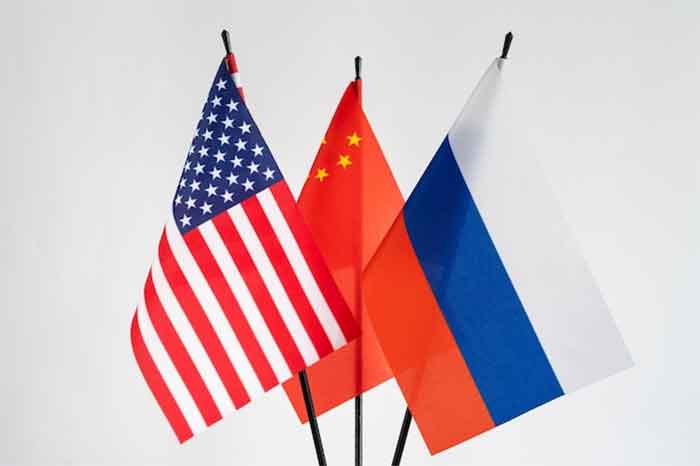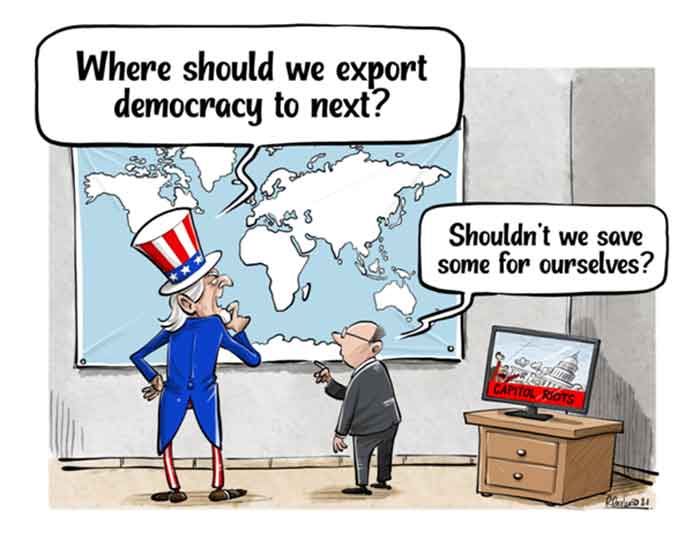
During the autumn of 2020, the United States lost one of its most brilliant, incisive, yet unheralded thinkers in Sherle R. Schwenninger.
One of Schwenninger’s many gifts was his ability to anticipate far in advance trends that would shape U.S. foreign policy and the global political economy. He was also one of the first thinkers to promote an alternative to the stale liberal internationalism and neoconservatism that have dominated the foreign policy discussion in Washington. According to Schwenninger, “The progressive realist critique… centered around international law; non-intervention; disarmament; and winding down the worst excesses of the post-9/11 period.” Though he sadly did not live to see it, perhaps history is finally moving in Schwenninger’s direction as far as U.S. foreign policy is concerned.
The idea, progressive realism, was the focus of a special issue of the Nation on foreign policy that was edited by Schwenninger during the week Donald Trump took office in January 2017.
In an unsigned introductory note, Schwenninger wrote that “progressives would be wise to avoid two tendencies” in the coming years. He further said:
“The first is defining a progressive foreign policy as simply a rejection of whatever Trump says or does. Of course, he has already appointed some dangerous extremists to important foreign-policy positions, and Trump himself is erratic at best… But some of his statements—his calls to work with Russia, end America’s destructive wars, and create more equitable trade agreements—are not so far removed from ones that we ourselves have embraced. We will need to champion our own progressive version of these positions rather than simply reject them outright.
“The second tendency we should avoid is falling into nostalgia for the Obama era.”
The advice he offered American liberals and progressives, which now hardly needs pointing out, was resoundingly rejected.
Indeed, building a viable progressive foreign policy alternative after 2017 was made virtually impossible by the childish hysteria that marked the liberal reaction toward Trump. On Capitol Hill, meanwhile, out of the entire Democratic caucus, only three—Bay Area Reps. Ro Khanna and Barbara Lee and Oregon Sen. Jeff Merkley—seemed receptive to such a policy, with hardly anyone else showing any enthusiasm for it. And attempts by Schwenninger and others on lobbying with stakeholders who should have been natural allies within the 2016 Bernie Sanders campaign to adopt such a policy were met with frustration.
Needless to say, for years there had been hardly any enthusiasm for progressive realist ideas at the leading think tanks and graduate schools of international relations in Washington. This was particularly true with regard to the New America Foundation, the think tank Schwenninger founded in the 1990s with Michael Lind, Ted Halstead and Walter Russell Mead, which is now known as New America.
The direction New America took in recent years was something of a sore spot for the otherwise equanimous Schwenninger, who was appalled by the turn it took in the years since it was taken over by Anne-Marie Slaughter, who served as foreign policy adviser under Hillary Clinton’s State Department. It was Slaughter who turned the organization into a well-funded platform for the very types of intellectuals Schwenninger distrusted most: Liberals in search of the next war.
By the time he and I became friends, the major organs of opinion in Washington and New York had become incredibly hostile toward the few of us who publicly objected to the idea that the U.S. must wage not only nine illegal and unconstitutional wars but a two-front cold war with Russia and China as well. Schwenninger could only shake his head at the spectacle of the otherwise intractable Trump opponents transforming themselves, in the blink of an eye, into his loudest cheerleaders when he decided to bomb Syria.
At the same time, Schwenninger caught sight of another troubling trend: the emerging alliance between Silicon Valley, the Pentagon and Wall Street. Schwenninger frequently lamented what he said was the “progressive totalitarianism” of the left when it came to foreign policy; during the Trump years, anyone who dared suggest that détente with Russia might be a sensible policy, or that, perhaps, the war in Syria was a bit more complicated than the pro-Islamist narrative being propagated by corporate media (particularly CNN and the Washington Post), would, more often than not, be immediately labeled as a Putin and/or Assad apologist… or worse.
That these attacks were coming from liberals and progressives who were consciously turning their backs on their own tradition of anti-McCarthyism made this spectacle all the more pathetic.
But something has changed over the past year or so, owing, I believe, to a change in the “atmospherics” in Washington brought about by Trump’s departure. All of a sudden, it now seems that space has opened up for those seeking to promote a kind of “Schwenningerian” foreign policy. The first mainstream group that appeared willing to do so was the Charles Koch and George Soros-funded Quincy Institute for Responsible Statecraft, which was founded in 2019. In the years following, long-established think tanks such as the Carnegie Endowment for International Peace and the Atlantic Council have established in-house programs that promote a more realistic and restrained U.S. foreign policy.
Still more encouraging, in his speech announcing the end of the 20-year occupation of Afghanistan, President Joe Biden repeatedly invoked “national interest” in defense of his decision to withdraw from Afghanistan. For Biden, this was the end of “an era of major military operations to remake other countries.”
In the speech by Biden on August 31, he further said:
“To those asking for a third decade of war in Afghanistan, I ask: What is the vital national interest?…
“I respectfully suggest you ask yourself this question: If we had been attacked on September 11, 2001, from Yemen instead of Afghanistan, would we have ever gone to war in Afghanistan—even though the Taliban controlled Afghanistan in 2001? I believe the honest answer is ‘no.’ That’s because we had no vital national interest in Afghanistan other than to prevent an attack on America’s homeland and our friends.
“The fundamental obligation of a President, in my opinion, is to defend and protect America.…
“I simply do not believe that the safety and security of America is enhanced by continuing to deploy thousands of American troops and spending billions of dollars a year in Afghanistan.”
In doing so, Biden seems to have adopted a number of themes that scholars like Schwenninger have long advocated.
Though he sadly did not live to see it, perhaps history is finally moving in Schwenninger’s direction as far as U.S. foreign policy is concerned.
James W. Carden is a writing fellow at Globetrotter and a former adviser to the U.S. State Department. Previously, he was a contributing writer on foreign affairs at the Nation, and his work has also appeared in the Quincy Institute’s Responsible Statecraft, the American Conservative, Asia Times, and more.
This article was produced by Globetrotter.















































